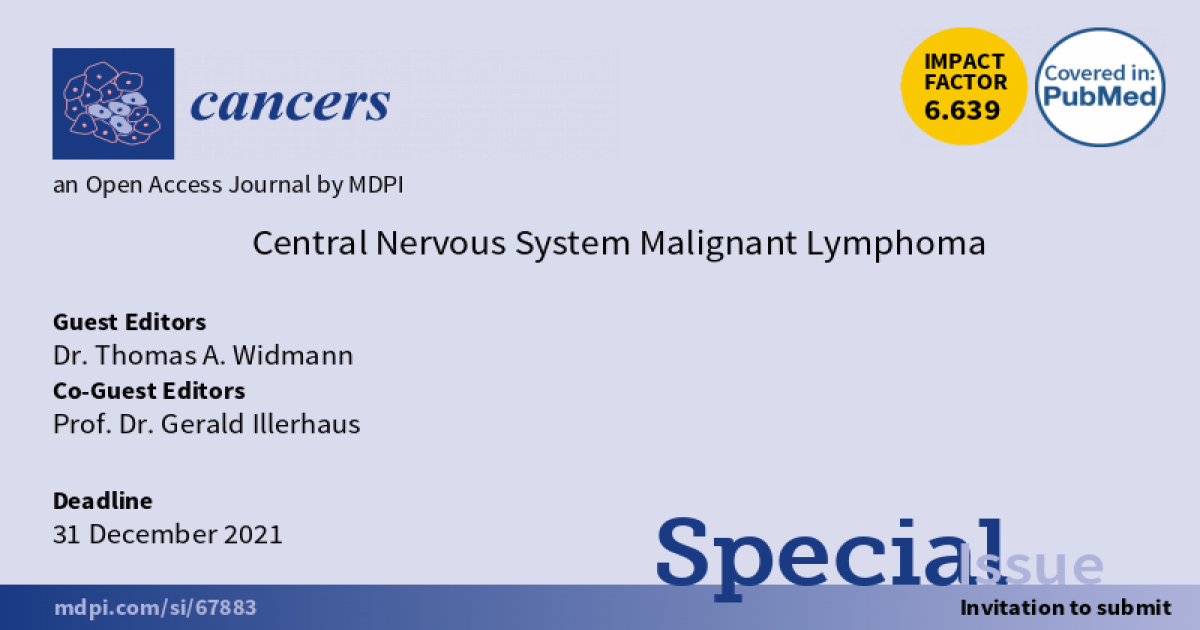Central Nervous System Malignant Lymphoma
A special issue of Cancers (ISSN 2072-6694). This special issue belongs to the section "Cancer Therapy".
Deadline for manuscript submissions: closed (31 December 2021) | Viewed by 3552

Special Issue Editors
Interests: cancer rehabilitation; exercise after cancer; lymphomas
Special Issue Information
Dear Colleagues,
Primary diffuse large B-cell lymphoma (DLBCL) of the central nervous system (PCNSL) is a rare disorder confined to the CNS. The development of high-dose methotrexate-based immune-chemotherapy in recent decades has enabled high-remission rates, and cure or multi-year progression-free survival can be obtained by consolidation strategies such as high-dose chemotherapy and autologous stem-cell transplantation.
However, this therapeutic success is offset by relevant therapy-related toxicity. Furthermore, survival deteriorates tremendously in the refractory or relapsed setting as well as in the frail population not eligible for aggressive treatment options. Secondary CNS lymphoma (SCNSL), as a rare complication of systemic non-Hodgkin lymphoma, shares this dismal prognosis. In SCNSL, optimal treatment is not established. Cellular or molecular interactions that facilitate trafficking of lymphoma cells to the CNS are pending, and risk factors detecting patients in need of MTX-based CNS prophylaxis are still a matter of debate.
Recent research has detected different molecular tumor characteristics in CNS lymphoma, potentially targetable by new substances. How these findings could translate into clinical progress, also in the context of combination therapies, must be defined.
As this abstract discloses the need for further research into the broad area of CNS lymphoma, we welcome translational and clinical research papers and reviews for this Special Issue.
Dr. Thomas A. Widmann
Prof. Dr. Gerald Illerhaus
Guest Editors
Manuscript Submission Information
Manuscripts should be submitted online at www.mdpi.com by registering and logging in to this website. Once you are registered, click here to go to the submission form. Manuscripts can be submitted until the deadline. All submissions that pass pre-check are peer-reviewed. Accepted papers will be published continuously in the journal (as soon as accepted) and will be listed together on the special issue website. Research articles, review articles as well as short communications are invited. For planned papers, a title and short abstract (about 100 words) can be sent to the Editorial Office for announcement on this website.
Submitted manuscripts should not have been published previously, nor be under consideration for publication elsewhere (except conference proceedings papers). All manuscripts are thoroughly refereed through a single-blind peer-review process. A guide for authors and other relevant information for submission of manuscripts is available on the Instructions for Authors page. Cancers is an international peer-reviewed open access semimonthly journal published by MDPI.
Please visit the Instructions for Authors page before submitting a manuscript. The Article Processing Charge (APC) for publication in this open access journal is 2900 CHF (Swiss Francs). Submitted papers should be well formatted and use good English. Authors may use MDPI's English editing service prior to publication or during author revisions.
Keywords
- PCNSL primary CNS lymphoma
- secondary CNS lymphoma
- pathogenesis
- translational research
- targeted therapy
- development of new CNS lymphoma treatment options
- high-dose chemotherapy
- autologous stem-cell therapy
- cancer rehabilitation







